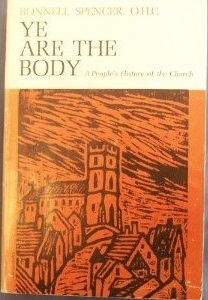 A History of the Anglican/Episcopalian Church
A History of the Anglican/Episcopalian Church
Author: Bonnell Spencer
In between cozy mysteries and bouts of classical literature, I always make sure to be reading one religious/spiritual book to continue building my own faith life. This usually means that I track straight for a C.S. Lewis, but this time I felt that a little history of the church was in order. Having transitioned from a fundamentalist (similar to Southern Baptist) raising in college, I finally meandered into the Episcopal Church several years ago and found myself truly feeling at home. Regardless, I am still an infant as far as church knowledge, tradition, and history are concerned, and I decided it was time to hone in on the facts. Finding Ye Are the Body, which appears to be the 1960 edition of the text (the copyright on my edition points to 1958), lying around in my mother’s religious books collection, I decided to spend a week or two reading about the history of my new found church home before going back to the more entertaining realms of C.S. Lewis. Nearly a year of tedious reading later, slowly chugging through the occasional chapter in between fictional escapes, I still know next to nothing about the history of the church. On the other hand, my life long dislike of history classes and all those names and dates has been reconfirmed.
The most recent edition of Bonnell Spencer’s Ye are the Body seems to be 1976, meaning that this particular tome is long since out of print, my late 50s/early 60s edition even more so. But it’s history and subject remain largely unchanged. Beginning with the pre-Christian church era, the book progresses through the periods of church history with each period being given its own section as follows: The Origin of the Christian Church, The Apostolic Church, The Age of Persecution, The Age of the Councils, The Dark Ages, The Medieval Church, The Reformation, The Church Divided, The Church of England, The Church in America, and The Dawn of a New Age. Each section has its own subsections, and as you can see, this 400 page book with its tightly stacked text covers a lot of ground. Yet, despite all the details, and a fairly decent organization strategy (well, the obvious chronological choice really, but hey), the details don’t resonate. In other words, you won’t remember a thing you read ten minutes after closing the book.
Disclosure: I’m not a history connoisseur by any stretch of the imagination, and perhaps this impaired my ability to soak up all the details in this book. In my college days, I was able to memorize and regurgitate names and dates long enough to pass a test, but that was with tedious effort. Without the threat of an assignment or an alerted GPA hanging over my head, the seemingly never ending list of names, dates, and brief snippets of summary information projected before, you guessed it, more names and dates, left me re-reading sentences because I just kept zoning.
The peculiar nature of narration did jar me occasionally. Mostly being a factual book, the occasional interjection of opinion from the author (i.e. the stating that someone was misunderstood, underappreciated, super great, and what have you) undermined the scholarly atmosphere, just furthering my slip into sloth. The concluding chapter, showing its aging with a good discussion of communism, completely breaks the spell with a proposition that American individualism goes against church traditionalism in that community is stronger than self and church is a community, leads the reader wondering why a supposedly serious history book has to gut punch some personal morals in the conclusion. Shrug. This is why I don’t like history books that much. The standard of objectivity is hard to attain and practically impossible, or so it seems, to maintain.
Before you shake your head and tell me to go back to my fiction and my reader friendly Lewis selections, let me point out that I did read (translation adamantly devour) a 400 odd page book on the history of the Congo from King Leopold to just after Mobutu. I loved it and enjoyed the way in which made history not a collection of statistics and events, but a relevant and interesting sequence with wide ranging effects and lessons to be determined by the reader and not spoon fed or randomly dropped by the author. So, I am capable of reading history and liking it, even esoteric history that most people wouldn’t care for. I’m convinced then that it was the presentation in Ye Are the Body which I found so humdrum and while all the facts are undoubtedly there, it hardly matters if the reader doesn’t remember them.
- Frances Carden
- Book Vs Movie: The Shining - April 6, 2020
- Thankful For Great Cozy Mysteries - December 13, 2019
- Cozy Mysteries for a Perfect Fall - October 20, 2019



Leave A Comment